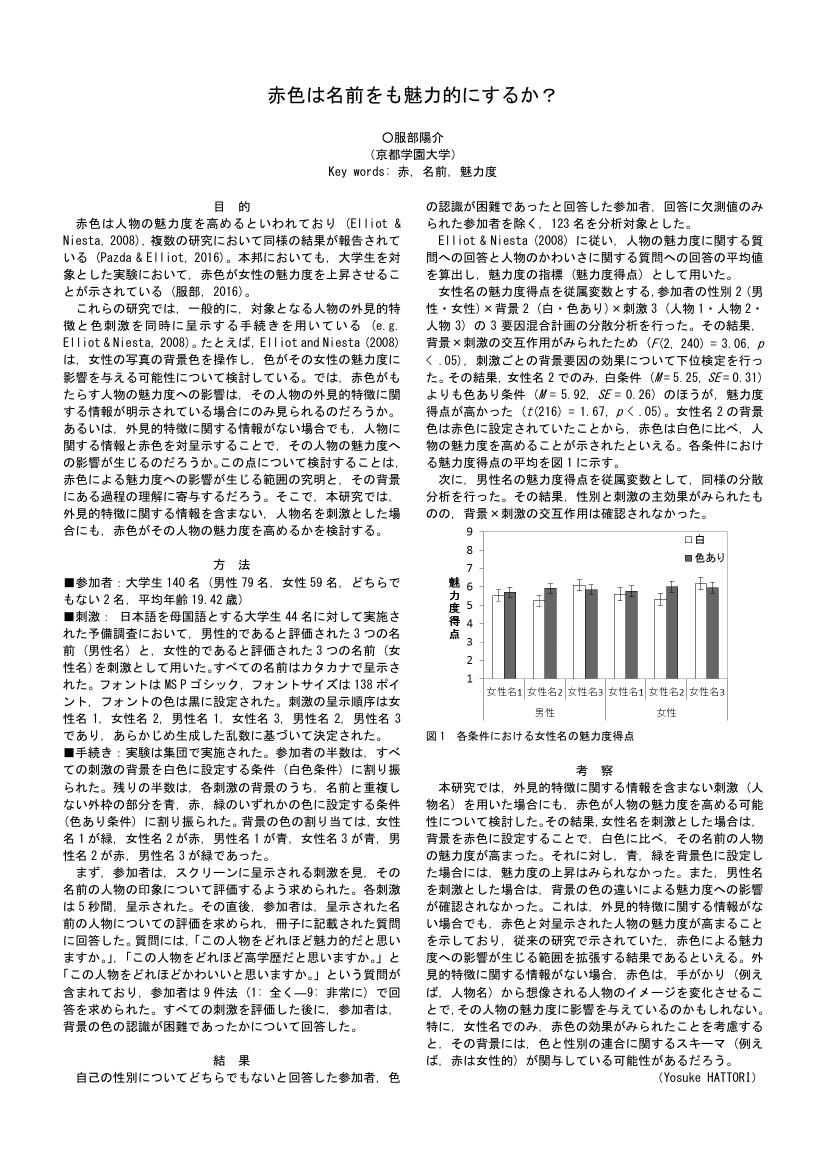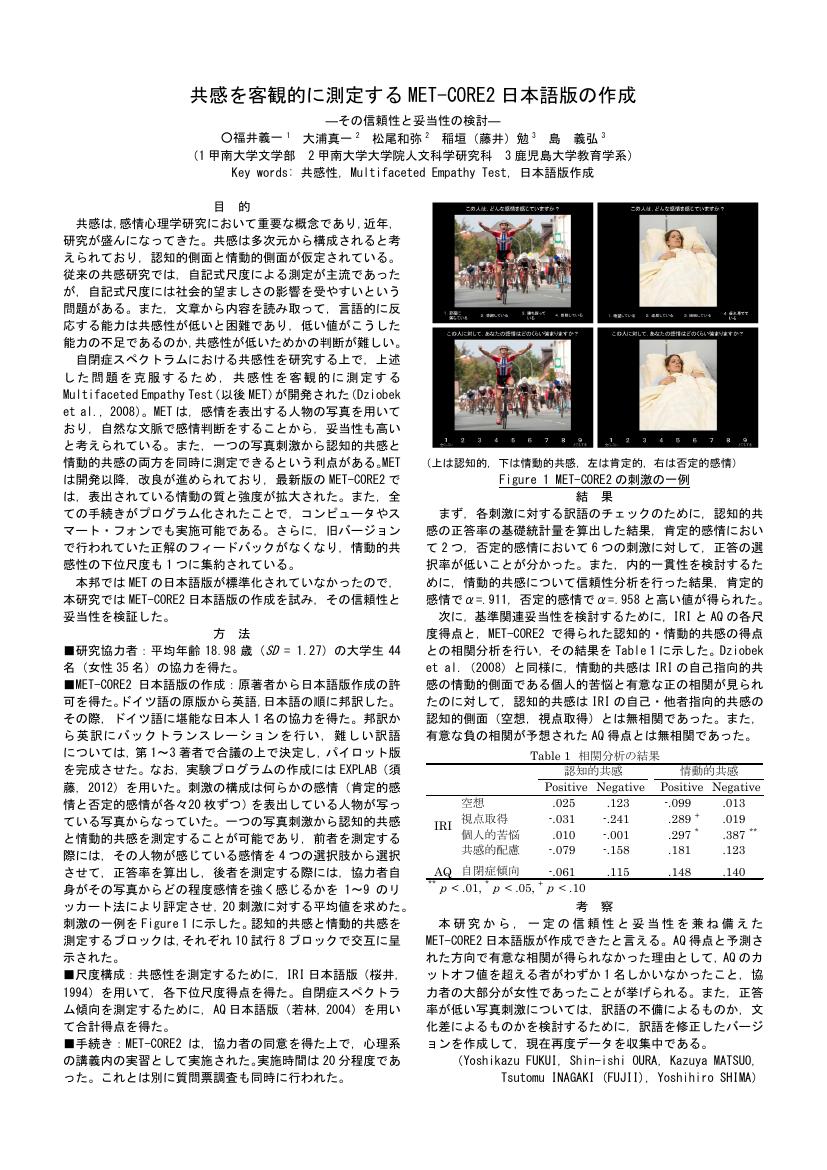1 0 0 0 OA シャーデンフロイデと意思決定との関連の検討
- 著者
- 相羽 将智
- 出版者
- 日本感情心理学会
- 雑誌
- 感情心理学研究 (ISSN:18828817)
- 巻号頁・発行日
- vol.26, no.Supplement, pp.ps08, 2018 (Released:2019-06-08)
1 0 0 0 OA 公恥系状況および私恥系状況における恥の発生メカニズム
- 著者
- 樋口 匡貴
- 出版者
- JAPAN SOCIETY FOR RESEARCH ON EMOTIONS
- 雑誌
- 感情心理学研究 (ISSN:18828817)
- 巻号頁・発行日
- vol.7, no.2, pp.61-73, 2001-04-30 (Released:2009-04-07)
- 参考文献数
- 24
- 被引用文献数
- 4 2
This study had two purposes; first, to reconstruct existing models of the mediating mechanisms of embarrassment, and second, to examine the mechanisms underlying the 6 groups of emotions that comprise embarrassment. Two hundred and eighty-eight university students were presented with "Public" or "Private" embarrassing situations, and were asked to rate 18 items related to the 6 elements representing the existing models, and 23 items measuring the 6 groups of emotions of embarrassment. Both explanatory and confirmatory factor analyses revealed that the existing models could be integrated into 4 causal factors. Covariance structure analysis was then conducted to examine the relationship of these 4 factors with each group of emotions. In the Public situations, 3 causal factors affected each group of emotions, although the nature of the effect varied between groups. In the Private situations, none of the groups were affected by "Apprehension of Social Evaluation" and "Disruption of Social Interaction." These results were discussed in relation to the groups of emotions of embarrassment in public and private situations.
1 0 0 0 OA ストレス負荷時における唾液アミラーゼ値と音色との関連
- 著者
- 川口 めぐみ
- 出版者
- 日本感情心理学会
- 雑誌
- 感情心理学研究 (ISSN:18828817)
- 巻号頁・発行日
- vol.26, no.Supplement, pp.ps24, 2018 (Released:2019-06-08)
1 0 0 0 OA 反すうの思考内容と気分状態の分類
- 著者
- 大井 瞳 望月 聡
- 出版者
- 日本感情心理学会
- 雑誌
- 感情心理学研究 (ISSN:18828817)
- 巻号頁・発行日
- vol.25, no.Supplement, pp.ps19, 2017 (Released:2017-11-28)
1 0 0 0 OA 好奇心の5次元尺度の日本語版の開発
- 著者
- 西川 一二
- 出版者
- 日本感情心理学会
- 雑誌
- 感情心理学研究 (ISSN:18828817)
- 巻号頁・発行日
- vol.26, no.Supplement, pp.os04, 2018 (Released:2019-06-08)
- 被引用文献数
- 1
1 0 0 0 OA 怒り感情の制御に関する調整要因の検討:感情生起対象との関係性に着目して
- 著者
- 吉田 琢哉 高井 次郎
- 出版者
- 日本感情心理学会
- 雑誌
- 感情心理学研究 (ISSN:18828817)
- 巻号頁・発行日
- vol.15, no.2, pp.89-106, 2008 (Released:2008-08-06)
- 参考文献数
- 78
- 被引用文献数
- 4 1
The effects of expression or non-expression of negative emotions have been of particular interest to researchers of emotion regulation. Among the variety of negative emotions, anger poses a particularly detrimental consequence on interpersonal relationships and mental health, whether expressed or not. The constructive expression of anger and trial of revision has been the recent focus of an effective method of anger regulation. However, the most effective tactic is contingent on the interpersonal relationship with the agent of arousal, as norms pertaining to emotional expression may differ depending on the level of intimacy or power distance. Thus, the present study examined the moderating effect of relational variables with the agent of anger arousal. A native anger regulation scale suggested a five-factor structure: Emotional expression, Constructive expression, Expression toward third person, Suppression, and Reappraisal attempt. To confirm the moderating effects of interpersonal relations, evaluations of past anger-arousing experiences between two conditions, one toward a non-intimate target with higher status, and another toward an intimate target with equal status, were compared. Results suggested that Reappraisal attempt had a positive effect on relationship evaluation in the non-intimate, higher status condition, while constructive expression had a positive effect in the intimate, equal status condition. Further examination of relationship factors, content of anger experience, and other moderating factors was discussed.
1 0 0 0 OA 大学生の心配に対するメタ認知に焦点を当てた認知行動的介入の効果
- 著者
- 金築 優 金築 智美 根建 金男
- 出版者
- 日本感情心理学会
- 雑誌
- 感情心理学研究 (ISSN:18828817)
- 巻号頁・発行日
- vol.17, no.3, pp.169-179, 2010-03-25 (Released:2011-02-20)
- 参考文献数
- 28
Worry is perseverative negative thinking about what may happen in the future. In this study, we examined the effects of cognitive behaviour intervention focused on metacognitive beliefs about worry, on alleviating worry in Japanese university students with high trait worry scores. Metacognitive be-liefs about worry refer to the beliefs that individuals have about their own worries, such as beliefs about the natures and functions of their own worries.In study I, we administered cognitive-behavioural psychoeducation to high worriers, with a fo-cus on metacognitive beliefs about worry. As a result, individuals who received the psychoeducation (n=13) were less anxious than the placebo intervention group (n=10) at a worry-provoking task.In study II, eighteen high worriers served as subjects. They were assigned to either a self-instructional training (SIT; n=9) group focusing on metacognition or a waiting list control (WLC; n=9) group. As a result, SIT produced a signi.cantly larger treatment effect on modifying negative metacognitive beliefs about worry. In addition SIT was superior to waiting-list control, in yielding improvements on worry related measures.These results show that modi.cation of negative metacognitive beliefs about worry has the effect of alleviating trait worry. The theoretical and clinical implications of these results were discussed.
1 0 0 0 OA 親密な他者に対する攻撃行動が生じるメカニズムの検討
- 著者
- 伊藤 義徳 新垣 美羽
- 出版者
- 日本感情心理学会
- 雑誌
- 感情心理学研究 (ISSN:18828817)
- 巻号頁・発行日
- vol.21, no.Supplement, pp.38, 2013 (Released:2013-09-19)
1 0 0 0 OA 感謝の対象に関する検討
- 著者
- 戸梶 亜紀彦
- 出版者
- 日本感情心理学会
- 雑誌
- 感情心理学研究 (ISSN:18828817)
- 巻号頁・発行日
- vol.21, no.Supplement, pp.41, 2013 (Released:2013-09-19)
- 参考文献数
- 2
1 0 0 0 OA 大学生の両親に対する行動と両親からのソーシャル・サポート,家族機能,抑うつの関連
- 著者
- 田中 奈津美 長谷川 晃
- 出版者
- 日本感情心理学会
- 雑誌
- 感情心理学研究 (ISSN:18828817)
- 巻号頁・発行日
- vol.26, no.2, pp.36-46, 2019-03-31 (Released:2019-04-02)
- 参考文献数
- 31
Longitudinal associations among behaviors toward parents, family relationships, and depression were investigated. In Study 1, undergraduate students (n=356) responded to items that represented behaviors toward their fathers and mothers. Exploratory factor analyses extracted three factors: Behaviors as equals, Intimate behaviors, and Aggressive verbal behaviors. Based on these results, the Behaviors toward Father Scale and the Behaviors toward Mother Scale were developed. In Study 2, undergraduate students (n=194) responded to measures assessing behaviors toward parents, parents’ social support, family function, and depression, twice at the interval of six weeks. Results indicated that Behaviors as equals toward both parents at Time 1 increased their social support to students at Time 2. Moreover, Behaviors as equals toward mothers increased family function. Also, social support from fathers and family function decreased depression. Additionally, depression increased Behaviors as equals and Intimate behaviors toward both parents, as well as Aggressive verbal behaviors toward fathers. These findings suggest that depression among undergraduate students might increase behaviors which strengthen family relationships.
1 0 0 0 OA 食物への渇望(food craving)と気分状態との関連
- 著者
- 小松 さくら 友野 隆成 青山 謙二郎
- 出版者
- 日本感情心理学会
- 雑誌
- 感情心理学研究 (ISSN:18828817)
- 巻号頁・発行日
- vol.17, no.2, pp.129-133, 2009-11-25 (Released:2010-05-08)
- 参考文献数
- 21
- 被引用文献数
- 1 1
The aims of this study were to see whether the most frequently experienced food craving of Japanese males was for rice, and to investigate the relationship between mood and food cravings, especially for rice. Undergraduate students completed a questionnaire of several measures, including gauging food craving frequency, the Japanese version of DEBQ, and the Japanese version of POMS. The highest item on the mean scores of craving frequency was rice, for both males and females. For both males and females, correlation analysis showed no significant correlation between mood and craving frequency for rice. For females, there was significantly positive correlation between negative mood and craving frequency for foods other than rice. However, for males, there was significantly positive correlation between positive mood and craving frequency for foods other than rice. These findings suggested the possibility that rice craving may be characteristic of Japanese people and indicated food cravings are associated with mood, though in different ways for females and males.
1 0 0 0 OA 表情からの感情知覚における顔方向の影響
- 著者
- 藤村 友美
- 出版者
- 日本感情心理学会
- 雑誌
- 感情心理学研究 (ISSN:18828817)
- 巻号頁・発行日
- vol.24, no.Supplement, pp.ps16, 2017 (Released:2017-04-03)
- 参考文献数
- 1
1 0 0 0 OA 身体的清潔さ,敏感さ,高揚感と心理的態度との関係
- 著者
- 上原 智香子
- 出版者
- 日本感情心理学会
- 雑誌
- 感情心理学研究 (ISSN:18828817)
- 巻号頁・発行日
- vol.25, no.Supplement, pp.ps46, 2017 (Released:2017-11-28)
- 参考文献数
- 1
1 0 0 0 OA 赤色は名前をも魅力的にするか?
- 著者
- 服部 陽介
- 出版者
- 日本感情心理学会
- 雑誌
- 感情心理学研究 (ISSN:18828817)
- 巻号頁・発行日
- vol.25, no.Supplement, pp.ps55, 2017 (Released:2017-11-28)
1 0 0 0 OA 共感を客観的に測定するMET-CORE2日本語版の作成
1 0 0 0 OA 尊敬の心理学的特徴に関する分析
- 著者
- 蔵永 瞳 樋口 匡貴
- 出版者
- 日本感情心理学会
- 雑誌
- 感情心理学研究 (ISSN:18828817)
- 巻号頁・発行日
- vol.21, no.3, pp.133-142, 2014-05-01 (Released:2014-09-11)
- 参考文献数
- 25
- 被引用文献数
- 4 1
To investigate the psychological characteristics of respect, 214 undergraduate students were asked to recall situations in which they respected others. The participants were asked to complete four types of survey items: a free description of the situation, the emotional experience of feeling respect, any feelings of shame, and the physiological reaction of feeling respect for others. Analysis showed that situations feel respect could be classified into four types: respect for others who have no interaction with the surveyed participant (e.g., a baseball player or architect), respect for superiors (e.g., a teacher, parent, or senior), respect for peers (e.g., a friend or class mate), and respect for junior peers (e.g., a younger member of a club). Further, factor analysis revealed two distinct emotional experiences of respect: adoration and awe. Correlation analysis showed that adoration was indicative of a self-reported sympathetic nervous reaction, and awe was indicative of a self-reported parasympathetic nervous reaction. In addition, the linkage between respect and shame differed by type of situation. For example, awe was positively associated with shame only in cases of respect for superiors or peers.
1 0 0 0 OA 民事紛争のウェブ相談における感情
- 著者
- 荒川 歩
- 出版者
- 日本感情心理学会
- 雑誌
- 感情心理学研究 (ISSN:18828817)
- 巻号頁・発行日
- vol.20, no.Supplement, pp.5, 2013 (Released:2013-04-10)
1 0 0 0 OA 論文撤回のお知らせ
- 出版者
- 日本感情心理学会
- 雑誌
- 感情心理学研究 (ISSN:18828817)
- 巻号頁・発行日
- vol.23, no.2, pp.95, 2016-01-30 (Released:2016-04-12)











